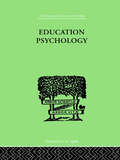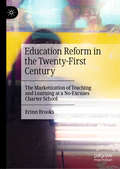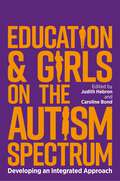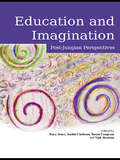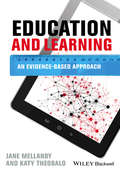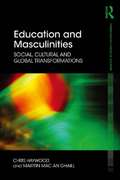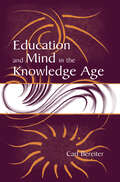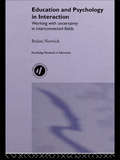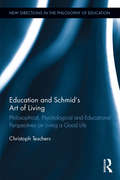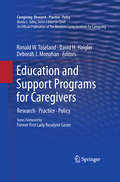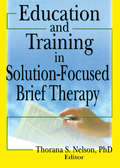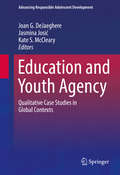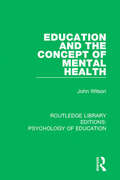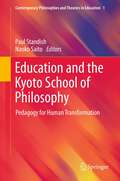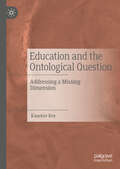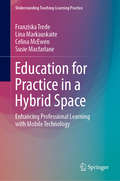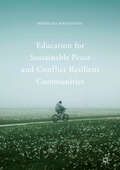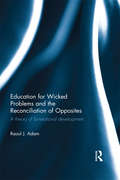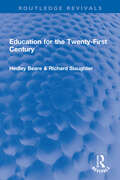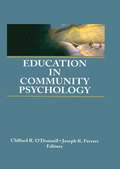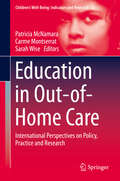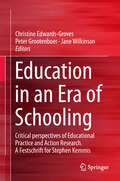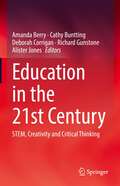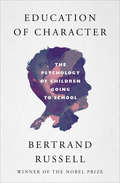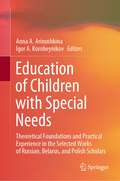- Table View
- List View
Education Psychology: BRIEFER COURSE
by E.L. ThorndikeThis is Volume VIII of thirty-two in a series on Developmental Psychology. Originally published in 1923, the author wites that our knowledge of human instincts and capacities, of the processes of learning and remembering, of mental work and fatigue, and of individual differences and their causes has been much increased in the past score of years. This Briefer Course represents a simpler treatment of the more fundamental subject matter of these volumes, organized as a text-book in Educational Psychology for students in colleges and schools.
Education Reform in the Twenty-First Century: The Marketization of Teaching and Learning at a No-Excuses Charter School
by Erinn BrooksThis book explores how, why, and with what consequences one no-excuses charter network marketizes teaching and learning, through the author’s 1000 hours of covert participant observation at a network charter school. In her research, Brooks found that the “AAG” (pseudonym) network re-conceptualized teaching by urging staff to envision their careers in corporate education rather than in classroom teaching. While some employees received a boost up the corporate ladder, others found themselves being pushed out of the organization. Despite AAG’s equity-conscious discourse, administrators emphasized controlling student behavior as a central measure of teaching effectiveness. Brooks develops the concept of creative compliance to describe the most successful teachers’ tactics for adhering to formal policies strategically, bending the rules in order to survive and advance in a workplace fraught with competition and insecurity.
Education and Girls on the Autism Spectrum: Developing an Integrated Approach
by Christopher Gillberg Judy Eaton Alexandra Sturrock Siobhan O'Hagan Sarah Wild Gareth D. Morewood Carla Tomlinson Elizabeth Critchley Sarah-Jane Critchley Rachael SalterAddressing the gender gap in the understanding of autism, this multi-perspective book explores the educational needs of girls on the autism spectrum from early years to secondary school, in both mainstream and special settings. The collection, comprising insights from autistic women and girls and educational and medical professionals makes recommendations for a collaborative and integrated approach that enables girls on the spectrum to reach their full potential. By establishing close collaborations between girls on the spectrum, their parents, teachers and specialist professionals, the field can move forwards in terms of providing understanding and an appropriate educational framework for success.
Education and Imagination: Post-Jungian Perspectives
by Raya A. Jones Austin Clarkson Sue Congram Nick StrattonHow can Jungian psychology be applied to the educational setting? Education and Imagination explores the application of Jungian perspectives in educational settings, establishing the creative imagination as a critical and necessary feature of learning throughout the lifespan. The book identifies various facets of applying contemporary Jungian thought to the issue at hand, in chapters that range from scholarly critiques to practical project reports. This straightforward and accessible resource addresses issues at the interface of education and imagination and the possible contribution of insights from Jungian psychology, in a practical, theoretical and imaginative way. Topics include: a synthesis of Jung and Vygotsky learning difficulties storytelling, socialisation, and individuation. Contributed to by authors professionally involved in education and training on the one side, and actively engaged with Jungian studies on the other, Education and Imagination will make essential reading for those involved in educational and training contexts, as well as the wider public of teachers, trainers, and students.
Education and Learning: An Evidence-based Approach
by Katy Theobald Jane MellanbyEducation and Learning offers an accessible introduction to the most recent evidence-based research into teaching, learning, and our education system. Presents a wide range references for both seminal and contemporary research into learning and teaching Examines the evidence around topical issues such as the impact of Academies and Free Schools on student attainment and the strong international performance of other countries Looks at evidence-based differences in the attainment of students from different socioeconomic and ethnic backgrounds, and explores the strong international performance of Finnish and East Asian students Provides accessible explanations of key studies that are supplemented with real-life case examples
Education and Masculinities: Social, cultural and global transformations (Foundations and Futures of Education)
by Chris Haywood Mairtin Mac an GhaillAcross media, academy and popular culture in western societies there is much talk of an implosion of the modern gender order. Education is often presented as a key site in which a crisis of masculinity is played out, and schools have become a focus for practical attempts to reconcile social and cultural transformations through the recalibration of teaching and learning, increasing male teachers and masculinising the content of subjects. Education and Masculinities argues that we are experiencing a shift from the establishment of the social constitution of gender associated with modernity politics, to the gendering of society that has an intensified resonance among men and women in a global-based late modernity. The book explores the main social and cultural approaches to education and masculinities within the broader context of sex and gender relations, considering the masculinity question alongside local and global changes in society, and bringing a fresh evaluation of key issues. Included in the book: -how the suggestion of ‘academically successful girls’ and ‘failing boys’ plays out in relation to issues of inequality across class and ethnicity -a current empirical analyses of gender inequality across schools, higher education and the labour market -representation, identity and cultural difference with reference to male and female social experiences and cultural meanings -forms of power connected to social divisions and cultural differences. Education and Masculinities provides a critical yet constructive diagnosis of gender relations across educational sites, exploring both academic accounts and alternative global responses that illustrate the limits of Western models and sensibilities.This accessible book will be valuable reading for students following courses in education, sociology, gender studies, and other social sciences and humanities courses.
Education and Mind in the Knowledge Age
by Carl BereiterIn this book, Carl Bereiter--a distinguished and well-known cognitive, educational psychologist--presents what he calls "a new way of thinking about knowledge and the mind." He argues that in today's Knowledge Age, education's conceptual tools are inadequate to address the pressing educational challenges and opportunities of the times. Two things are required: first, to replace the mind-as-container metaphor with one that envisions a mind capable of sustaining knowledgeable, intelligent behavior without actually containing stored beliefs; second, to recognize a fundamental difference between knowledge building and learning--both of which are essential parts of education for the knowledge age. Connectionism in cognitive science addresses the first need; certain developments in post-positivist epistemology address the second. The author explores both the theoretical bases and the practical educational implications of this radical change in viewpoint. The book draws on current new ways of thinking about knowledge and mind, including information processing, cognitive psychology, situated cognition, constructivism, social constructivism, and connectionism, but does not adhere strictly to any "camp." Above all, the author is concerned with developing a way of thinking about the mind that can usher education into the knowledge age. This book is intended as a starting point.
Education and Psychology in Interaction: Working With Uncertainty in Interconnected Fields (Routledge Research in Education)
by Brahm NorwichThis book takes an in-depth look at how education and psychology relate to each other, and at the current state of this relationship. Through comprehensive analysis of the ideological, historical, social and professional contexts of this interaction, the author develops the theme that, despite basic differences in aims, the fields are interconnected.
Education and Schmid's Art of Living: Philosophical, Psychological and Educational Perspectives on Living a Good Life (New Directions in the Philosophy of Education)
by Christoph TeschersInstead of simply following the current neoliberal mantra of proclaiming economic growth as the single most important factor for maintaining well-being, Education and Schmid’s Art of Living revisits the idea of an education focused on personal development and the well-being of human beings. Drawing on philosophical ideas concerning the good life and recent research in positive psychology, Teschers argues in favour of shifting the focus in education and schooling towards a beautiful life and an art of living for today's students. Containing a thorough discussion of the ideas of contemporary German philosopher Wilhelm Schmid, this book considers the possible implications of developing a more humanistic and life-centred approach to educational policy, research and practice, showing that Schmid’s concept of Lebenskunst provides a firm philosophical basis for this endeavour. Among others, this book draws on analytical and continental traditions to challenge current views and assumptions in regard to education and the role of schooling for contemporary societies. As a result, Teschers’ work is sure to spark a debate about the direction of educational policy and practice in the 21st century. Education and Schmid’s Art of Living is essential reading for academics and students with an interest in education. Given the importance of such topics as the relationship between education and society, teacher education and how best to structure schools and learning environments, Teschers’ work will appeal to academics and students in a diverse range of fields, including education, philosophy, sociology and psychology.
Education and Support Programs for Caregivers
by Deborah J. Monahan David H. Haigler Ronald W. ToselandFor many, caring for a chronically ill family member is "the right thing to do", but it is also often a source of emotional hardship, physical stress, and social isolation. In response, skill-building, coping, and psychoeducational programs have emerged to help caregivers meet the changes and challenges in their - as well as the patients' - lives. Education and Support Programs for Caregivers reveals the diversity of the caregiver population as well as their experiences and needs, and it introduces an empirically solid framework for planning, implementing, and evaluating caregiver programs. The book synthesizes current trends, exploring the effectiveness of different types of programs (e.g., clinic, community, home based) and groups (e.g., peer, professional, self-help), and how supportive programs lead to improved care. Coverage includes: Improving service delivery of education and support programs to underserved caregivers.Cultural, ethnic, and gender issues in conducting caregiver education and support groups.Utilization patterns (e.g., a key to understanding service needs).E-health, telehealth, and other technological developments in caregiver services.Evaluating the effectiveness and sustainability of programs.Recommendations for future practice, training, policy, and advocacy.Education and Support Programs for Caregivers offers a wealth of insights and ideas for researchers, practitioners, and graduate students across the caregiving fields, including psychology, social work, public health, geriatrics and gerontology, and medicine as well as public and education policy makers.
Education and Training in Solution-Focused Brief Therapy
by Thorana S NelsonThe one-of-a-kind book that provides training exercises illustrating solution-focused brief therapy!As we recognize our own problem behavior in our lives, most of us struggle for ways to change it. Solution-focused brief therapy is the highly effective practice that works by changing concentration from &’problem&’ behavior to &’solution&’ behavior in just a few sessions. Education and Training in Solution-Focused Brief Therapy presents articles, essays, and a multitude of exercises that explain this unique type of therapy with an eye toward helping readers to use the ideas for use in their own training and practice. Detailed descriptions of training workshops and exercises spotlight the experiences of SFBT therapists to illuminate in-depth basic concepts and strategies.Education and Training in Solution-Focused Brief Therapy relies on two fundamental ideas, that of a therapist discovering and reinforcing a clients&’ existing solutions and exceptions to the problem. Expert trainers discuss strategies that work for training and practicing Solution-focused brief therapy. Several exercises for clients are examined, as well as exercises for the training and supervision of other practitioners learning the process. Exercises include The Name Game, the Complaining Exercise, Inside and Outside, the &’Deck of Trumps,&’ and the Solution-Focused Scavenger Hunt. Each chapter explains the circumstances in which to use each exercise, the best ways to enhance effectiveness, and how to stay on track in the teaching or training. This one-of-a-kind book includes helpful tables, thorough questionnaires, penetrating case studies, and each chapter is extensively referenced.Education and Training in Solution-Focused Brief Therapy discusses brief therapy principles such as: negotiating goals engagement through complimenting future orientation language should be imaginative and positive explanations and actions taken to solve problems are interconnected challenging the perceived causes of problems reframing the problem so that it becomes a friend acknowledgement and acceptance of clientEducation and Training in Solution-Focused Brief Therapy brings together essential ideas, suggestions, strategies, and exercises for solution-focused brief therapy training, making this an invaluable resource for solution-focused brief therapists and therapists who teach and train this form of therapy.
Education and Youth Agency
by Joan G. Dejaeghere Jasmina Josić Kate S. McclearyThis book offers a comprehensive overview of studies on youth agency across various parts of the world. It explores diverse perspectives on education, citizenship and future livelihoods, modernity and tradition, gender equality, and social norms and transformations as they relate to how young people construct their agency. Drawing on case studies of young women and men from Africa, the Americas and South Asia, this book illustrates the different ways in which education affects youth's beliefs, engagement, action, and identities in broader historical, social, cultural, economic, and political contexts. Chapters argue for education as a potential force for equity and explore how both formal schooling and informal educational programs may challenge and inspire youth through individual and collective action to change the social conditions affecting their lives and their communities. The global nature of this book gives readers a deeper understanding of youth agency as a dynamic process in relation to changing economic, political, and social environments. Featured topics include: The role of community context and relationships in shaping U. S. youth's citizen agency. Malala Yousafzai and media narratives of girls' education within Islam and modernity. Social capital, sexual relationships, and agency for Tanzanian youth. Boys' agency toward higher education in urban Jamaica. Children's economic agency in Kanchipuram, India. Vocational training and agency among Kenyan youth. Education and Youth Agency is an essential resource for researchers, educators, practitioners, and undergraduate and graduate students across such related disciplines as developmental psychology, international and comparative education, family studies as well as public health, educational policy and politics, youth studies, and social policy.
Education and the Concept of Mental Health (Routledge Library Editions: Psychology of Education)
by John WilsonThe concept of ‘normality’ or mental health is a difficult one to define, but educators and social psychologists must have a clear definition of it in order to proceed with practical work. In this stimulating and informative book, originally published in 1968, Mr Wilson discusses the idea of mental health, both as a general concept and specifically as it affects the teacher as educator. He deals with the problems of learning and the ‘difficult’ child, not confining his suggestions within the boundaries of curricular teaching but exploring the wider aspect of moral education.
Education and the Kyoto School of Philosophy
by Naoko Saito Paul StandishThe work of the Kyoto School represents one of the few streams of philosophy that originate in Japan. Following the cultural renaissance of the Meiji Restoration after Japan's period of closure to the outside world (1600-1868), this distinctly Japanese thought found expression especially in the work of Kitaro Nishida, Keiji Nishitani and Hajime Tanabe. Above all this is a philosophy of experience, of human becoming, and of transformation. In pursuit of these themes it brings an inheritance of Western philosophy that encompasses William James, Hume, Kant and Husserl, as well as the psychology of Wilhelm Wundt, into conjunction with Eastern thought and practice. Yet the legacy and continuing reception of the Kyoto School have not been easy, in part because of the coincidence of its prominence with the rise of Japanese fascism. In light of this, then, the School's ongoing relationship to the thought of Heidegger has an added salience. And yet this remains a rich philosophical line of thought with remarkable salience for educational practice. The present collection focuses on the Kyoto School in three unique ways. First, it concentrates on the School's distinctive account of human becoming. Second, it examines the way that, in the work of its principal exponents, diverse traditions of thought in philosophy and education are encountered and fused. Third, and with a broader canvas, it considers why the rich implications of the Kyoto School for for philosophy and education have not been more widely appreciated, and it seeks to remedy this. The first part of the book introduces the historical and philosophical background of the Kyoto School, illustrating its importance especially for aesthetic education, while the second part looks beyond this to explore the convergence of relevant streams of philosophy, East and West, ranging from the Noh play and Buddhist practices to American transcendentalism and post-structuralism.
Education and the Ontological Question: Addressing a Missing Dimension
by Kaustuv RoyThis book identifies and expands upon the link between ontology and education, exposing a lack of ontological inquiry as the vital missing element in the study and practice of modern education today. In this book, Roy aims to reintroduce ontological thinking and reasoning that grounds historical and modern educational understandings and practice. Beginning with a historical perspective, he then turns to examine the results of his scholarship into practical concerns of education such as language, dialogue, and curriculum: ultimately proposing a new way forward emphasizing a balance in the education effort between epistemic content and ontological disclosure.
Education for Practice in a Hybrid Space: Enhancing Professional Learning with Mobile Technology (Understanding Teaching-Learning Practice)
by Franziska Trede Lina Markauskaite Celina McEwen Susie MacfarlaneThis book presents a mobile technology capacity building framework that offers academics, students, and practitioners involved in workplace education a deeper understanding of, and practical guidance on, how mobile technology can enhance professional learning. Approaching professional and workplace learning as a hybrid space in which work, learning and technology meet, the book discusses the value of mobile technology in shaping professional education, particularly during student placements.The framework focuses on staying professional and safe, considering issues of time and place, planning learning activities, initiating dialogue, networking, creating learning opportunities on-the-go, and deepening reflection. It is designed to assist students and their educators to use mobile technology knowledgeably and responsibly, and to help bridge the gap between university learning and workplace practice.This book also contributes to a better understanding of the interconnectedness between learning, practice and technology. It demonstrates how to enhance learning and working with mobile technology by drawing on two perspectives: the ‘professional-plus’ and the ‘deliberate professional’.
Education for Sustainable Peace and Conflict Resilient Communities
by Borislava ManojlovicThis book articulates a practice and theory of education that aims to facilitate the emergence of sustainable peace and conflict-resilient communities in societies plagued by conflict. It does so by examining the agency of conflict-resilient communities and the dynamic processes of their interactions with larger societal structure. Although education is seen as a human right, the design of education policies, schooling models and curricula has primarily been the prerogative of elites, be they governments, academics or international actors. This book argues for a different approach to education, contending for more inclusivity and open deliberation in modeling education frameworks. Drawing on case studies and interviews with practitioners, scholars, activists, and policymakers, it applies the lenses of conflict resolution to a variety of education issues within fragile societies.
Education for Wicked Problems and the Reconciliation of Opposites: A theory of bi-relational development
by Raoul J. AdamThe recognition and reconciliation of ‘opposites’ lies at the heart of our most personal and global problems and is arguably one of the most neglected developmental tasks of Western education. Such problems are ‘wicked’ in the sense that they involve real-life decisions that have to be made in rapidly changing contexts involving irreducible tensions and paradoxes. By exploring our human tendency to bifurcate the universe, Education for Wicked Problems & the Reconciliation of Opposites proposes a way to recognise and (re)solve some of our most wicked problems. Applying an original theory of bi-relational development to wicked problems, Adam proposes that our everyday ways of knowing and being can be powerfully located and understood in terms of the creation, emergence, opposition, convergence, collapse and trans-position of dyadic constituents such as nature/culture, conservative/liberal and spirit/matter. He uses this approach to frame key debates in and across domains of knowledge and to offer new perspectives on three of the most profound and related problems of the twenty-first century: globalisation, sustainability and secularisation. This book is a comprehensive study of dyads and dyadic relationships and provides a multidisciplinary and original approach to human development in the face of wicked problems. It will be of great interest to students and academics in education and psychosocial development as well as professionals across a range of fields looking for new ways to recognise and (re)solve the wicked problems that characterise their professions.
Education for the Twenty-First Century (Routledge Revivals)
by Hedley Beare Richard SlaughterFirst published in 1993, Education for the Twenty-First Century grew out of a common and deep-seated concern about the way young people think of their own future, and about some of the relatively simplistic education reforms advocated, often by people with scant comprehension of modern educational practices. Schools as institutions, schooling patterns, the curriculum and teachers themselves have come under heavy criticism, but it has to be recognized that the problems in education have no lasting or satisfactory solutions while schools continue to operate out of the framework which has determined their raison d’être for the past two hundred years. The authors argue that schools do not need fine tuning, or more of the same; rather some of the fundamental assumptions about schooling have to be revised. They argue that learning about the future must become very much a part of the present, and they set out in the book some of the thinking and several techniques which permit us to confront the future and make it a more friendly place. The book will be of interest to students, teachers and policymakers.
Education in Community Psychology: Models for Graduate and Undergraduate Programs
by Joseph R Ferrari Clifford R O'DonnellA useful guide on education in the field of community research and action, Education in Community Psychology explores curriculum issues regarding coursework, field training, the status of research, and the need for promoting a multidisciplinary perspective. For your easy reference, it gives you a thorough overview of the kinds of undergraduate and graduate courses available and of freestanding and interdisciplinary graduate programs in both North America and New Zealand. For your convenience, it also covers the types of knowledge and skills taught in these courses and programs, the professional roles open to community graduates, how programs can work with community organizations, and the steps and issues you should consider when planning a community psychology course or program. From this book’s helpful pages, you will discover why interdisciplinary programs hold the most promise for innovation in graduate education, as well as the greatest potential for developing community research and action into an interdisciplinary field. If you are interested in setting up a program that helps students develop a ‘systems perspective’in the way they approach problems and issues in the community, Education in Community Psychology will help you get started. To this end, you learn about: the issues and strategies in teaching community psychology to your students practical steps for developing your program how to secure viable field placements for your students how your community psychology program can train psychologists in nontraditional roles suited to address human and social problems the ecology of masters’programs selecting required readings trends in interdisciplinary training using social functions that include faculty, students, and community agencies to develop collaborative working relationships the change in APA guidelinesEducation in Community Psychology provides community psychology professors and graduate students, psychology undergraduates intending to go to graduate school, and educators in human development and social work with a practical overview of the field of community research and action, its values, ethics, theories, and methods. With its sample course outlines, recommendations for faculty planning, and insights on how to develop community psychology programs, you will be able to extend your skills beyond the classroom and into the community, where it counts.
Education in Out-of-Home Care: International Perspectives on Policy, Practice and Research (Children’s Well-Being: Indicators and Research #22)
by Sarah Wise Carme Montserrat Patricia McNamaraThis book draws together for the first time some of the most important international policy practice and research relating to education in out-of-home care. It addresses the knowledge gap around how good learning experiences can enrich and add enjoyment to the lives of children and young people as they grow and develop. Through its ecological-development lens it focuses sharply on the experience of learning from early childhood to tertiary education. It offers empirical insights and best practices examples of learning and caregiving contexts with children and young people in formal learning settings, at home and in the community. This book is highly relevant for education and training programs in pedagogy, psychology, social work, youth work, residential care, foster care and kinship care along with early childhood, primary, secondary and tertiary education courses.
Education in an Era of Schooling: Critical Perspectives Of Educational Practice And Action Research. A Festschrift For Stephen Kemmis
by Peter Grootenboer Jane Wilkinson Christine Edwards-GrovesThis book is a Festschrift for Emeritus Professor Stephen Kemmis, who has a long and eminent career as an educational researcher and academic spanning over 40 years. His work in curriculum, evaluation, critical practice, action research and practice theory has been influential across all continents of the world.The book examines critical perspectives on educational practice and the participatory nature of action research, including practitioner research particularly as undertaken by teachers in schools. Including vignettes from Kemmis’ colleagues and mentors, it draws on contributions from a range of academics whose scholarship has been inspired, influenced and initiated by his work. The chapters stem from a range of countries, including Australia, Canada, Finland, weden, the United Kingdom, United States of America, and Trinidad and Tobago - a testimony to the enduring and global legacy of Kemmis’ scholarship. Contributing authors include leading educational research scholars, indigenous elders from Australia, and community leaders concerned with environmental sustainability.The concluding focus of this book turns towards practice theory. Kemmis’ later work led to the development of the theory of practice architectures and gave rise to the development of the theory of ecologies of practices in education. Research drawing on the theory of practice architectures and ecologies of practices resulted in the leading text “Changing practices, changing education” (Kemmis, Wilkinson, Edwards-Groves, Hardy, Grootenboer & Bristol, 2014, Springer) that reports on an Australian investigation of the ecological relationship between student learning, teaching, professional learning, leading and researching practices.This theory is now being applied to study practices across a wide range of international contexts, sites and disciplines including early childhood, school education, university education, vocational education and training, community environment, indigenous cultural sustainability and health.
Education in the 21st Century: STEM, Creativity and Critical Thinking
by Amanda Berry Alister Jones Cathy Buntting Deborah Corrigan Richard GunstoneThis book explores a range of issues central to STEM and 21st Century education. It explores research into the relationships between creativity, critical thinking and STEM Education from both a theoretical and practical perspective. It examines matters associated with three main concerns: First is the ways some research and development that is labelled “STEM” appears to be essentially one of the specific individual components, S, T, E or M, with a new label rather than something going across and/or beyond these more traditional components. The second, at times intertwining, concern is the common ways in which school curriculum continues to hold separate disciplines as its core. The third concern is that while cross-curriculum goals are increasingly common in this century - particularly for “creativity” and “critical thinking” - it is also common that the goals remain only vaguely linked with the more usual components of the whole curriculum. This book reflects on all three of these important concerns and the integrated whole that can result from them. Monash University, King’s College London and Waikato University have now generated six edited books on successive related research issues of significance to contemporary science education. Each of these books has been substantially shaped by a writing workshop involving all authors in intensive discussion about drafts of their contributions (a process of great worth in its own right, as well as for enhancing the value of the final volume), and then each author reworking the contribution in the light of the discussions The seventh will extend beyond science education and explore a range of issues central to STEM and 21st Century education.
Education of Character: The Psychology of Children Going to School
by Bertrand RussellThe Nobel Prize winner explores the role of early childhood education in building personal character. In Education of Character, great twentieth-century philosopher Bertrand Russell goes beyond math or history and into the larger purposes of education. What do we want our children to be like as people? What kind of future community do we want to build? And what approaches are most likely to achieve the results we want? Taking the discoveries of modern psychology into account, Russell notes that habits of mind are formed earlier than we may realize and represent a crucial part of children&’s ability to cope successfully with challenges as they grow older. Beginning with the very first year of life and giving consideration to both home and classroom, Russell discusses such topics as fear, play, selfishness, sympathy, and truthfulness—offering parents and other caregivers a set of guiding principles that can help them develop virtue and good character in youngsters.
Education of Children with Special Needs: Theoretical Foundations and Practical Experience in the Selected Works of Russian, Belarus, and Polish Scholars
by Anna A. Arinushkina Igor A. KorobeynikovThis book presents for the first time the results of scientific research in the field of special education and special psychology carried out by top experts of the Russian Federation and the Republic of Belarus. The range of problems discussed in the book reflects the most relevant areas of development of the education system and psychological and pedagogical assistance to children with special educational needs (SEN). Both scientific and methodological developments provide practitioners with modern means of diagnostic, correctional, developmental, and preventive work. Furthermore, responding to the current challenges, the authors present the results of research on the impact of virtual reality on the health of adolescents, the results of an experiment on the study and formation of financial literacy of high-school kids with developmental disorders, highlight approaches to the prevention of auto aggressive behavior in the adolescent environment, and offer the proven technologies for psychological and pedagogical habilitation and rehabilitation of children with SEN of various nosologic groups and children with somatic pathology studying at a hospital school. The theoretical block of the book includes an analysis of the fundamental problems of today’s pedagogical and social reality: substantiation of conceptual approaches to the construction of an inclusive space, consideration of the basic psychophysiological mechanisms of speech, the formation of a convergent network educational environment and some other problems that can directly or indirectly affect the quality of education, upbringing, and social adaptation of children with SEN. The book is intended for psychologists, special-need experts, teachers, methodologists, employees of educational organizations working with children with disabilities, specialists in the field of inclusive education, students and teachers of special education, and pedagogical and psychological departments of higher education institutions.
